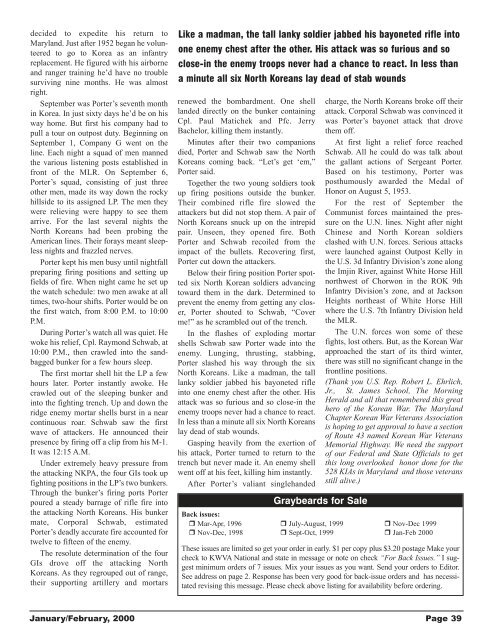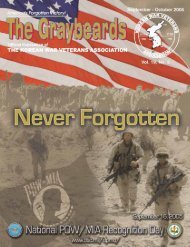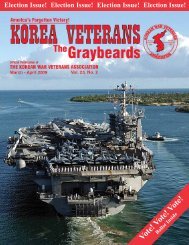The Graybeards - Korean War Veterans Association
The Graybeards - Korean War Veterans Association
The Graybeards - Korean War Veterans Association
Create successful ePaper yourself
Turn your PDF publications into a flip-book with our unique Google optimized e-Paper software.
decided to expedite his return to<br />
Maryland. Just after 1952 began he volunteered<br />
to go to Korea as an infantry<br />
replacement. He figured with his airborne<br />
and ranger training he’d have no trouble<br />
surviving nine months. He was almost<br />
right.<br />
September was Porter’s seventh month<br />
in Korea. In just sixty days he’d be on his<br />
way home. But first his company had to<br />
pull a tour on outpost duty. Beginning on<br />
September 1, Company G went on the<br />
line. Each night a squad of men manned<br />
the various listening posts established in<br />
front of the MLR. On September 6,<br />
Porter’s squad, consisting of just three<br />
other men, made its way down the rocky<br />
hillside to its assigned LP. <strong>The</strong> men they<br />
were relieving were happy to see them<br />
arrive. For the last several nights the<br />
North <strong>Korean</strong>s had been probing the<br />
American lines. <strong>The</strong>ir forays meant sleepless<br />
nights and frazzled nerves.<br />
Porter kept his men busy until nightfall<br />
preparing firing positions and setting up<br />
fields of fire. When night came he set up<br />
the watch schedule: two men awake at all<br />
times, two-hour shifts. Porter would be on<br />
the first watch, from 8:00 P.M. to 10:00<br />
P.M.<br />
During Porter’s watch all was quiet. He<br />
woke his relief, Cpl. Raymond Schwab, at<br />
10:00 P.M., then crawled into the sandbagged<br />
bunker for a few hours sleep.<br />
<strong>The</strong> first mortar shell hit the LP a few<br />
hours later. Porter instantly awoke. He<br />
crawled out of the sleeping bunker and<br />
into the fighting trench. Up and down the<br />
ridge enemy mortar shells burst in a near<br />
continuous roar. Schwab saw the first<br />
wave of attackers. He announced their<br />
presence by firing off a clip from his M-1.<br />
It was 12:15 A.M.<br />
Under extremely heavy pressure from<br />
the attacking NKPA, the four GIs took up<br />
fighting positions in the LP’s two bunkers.<br />
Through the bunker’s firing ports Porter<br />
poured a steady barrage of rifle fire into<br />
the attacking North <strong>Korean</strong>s. His bunker<br />
mate, Corporal Schwab, estimated<br />
Porter’s deadly accurate fire accounted for<br />
twelve to fifteen of the enemy.<br />
<strong>The</strong> resolute determination of the four<br />
GIs drove off the attacking North<br />
<strong>Korean</strong>s. As they regrouped out of range,<br />
their supporting artillery and mortars<br />
Like a madman, the tall lanky soldier jabbed his bayoneted rifle into<br />
one enemy chest after the other. His attack was so furious and so<br />
close-in the enemy troops never had a chance to react. In less than<br />
a minute all six North <strong>Korean</strong>s lay dead of stab wounds<br />
renewed the bombardment. One shell<br />
landed directly on the bunker containing<br />
Cpl. Paul Matichek and Pfc. Jerry<br />
Bachelor, killing them instantly.<br />
Minutes after their two companions<br />
died, Porter and Schwab saw the North<br />
<strong>Korean</strong>s coming back. “Let’s get ‘em,”<br />
Porter said.<br />
Together the two young soldiers took<br />
up firing positions outside the bunker.<br />
<strong>The</strong>ir combined rifle fire slowed the<br />
attackers but did not stop them. A pair of<br />
North <strong>Korean</strong>s snuck up on the intrepid<br />
pair. Unseen, they opened fire. Both<br />
Porter and Schwab recoiled from the<br />
impact of the bullets. Recovering first,<br />
Porter cut down the attackers.<br />
Below their firing position Porter spotted<br />
six North <strong>Korean</strong> soldiers advancing<br />
toward them in the dark. Determined to<br />
prevent the enemy from getting any closer,<br />
Porter shouted to Schwab, “Cover<br />
me!” as he scrambled out of the trench.<br />
In the flashes of exploding mortar<br />
shells Schwab saw Porter wade into the<br />
enemy. Lunging, thrusting, stabbing,<br />
Porter slashed his way through the six<br />
North <strong>Korean</strong>s. Like a madman, the tall<br />
lanky soldier jabbed his bayoneted rifle<br />
into one enemy chest after the other. His<br />
attack was so furious and so close-in the<br />
enemy troops never had a chance to react.<br />
In less than a minute all six North <strong>Korean</strong>s<br />
lay dead of stab wounds.<br />
Gasping heavily from the exertion of<br />
his attack, Porter turned to return to the<br />
trench but never made it. An enemy shell<br />
went off at his feet, killing him instantly.<br />
After Porter’s valiant singlehanded<br />
<strong>Graybeards</strong> for Sale<br />
charge, the North <strong>Korean</strong>s broke off their<br />
attack. Corporal Schwab was convinced it<br />
was Porter’s bayonet attack that drove<br />
them off.<br />
At first light a relief force reached<br />
Schwab. All he could do was talk about<br />
the gallant actions of Sergeant Porter.<br />
Based on his testimony, Porter was<br />
posthumously awarded the Medal of<br />
Honor on August 5, 1953.<br />
For the rest of September the<br />
Communist forces maintained the pressure<br />
on the U.N. lines. Night after night<br />
Chinese and North <strong>Korean</strong> soldiers<br />
clashed with U.N. forces. Serious attacks<br />
were launched against Outpost Kelly in<br />
the U.S. 3d Infantry Division’s zone along<br />
the Imjin River, against White Horse Hill<br />
northwest of Chorwon in the ROK 9th<br />
Infantry Division’s zone, and at Jackson<br />
Heights northeast of White Horse Hill<br />
where the U.S. 7th Infantry Division held<br />
the MLR.<br />
<strong>The</strong> U.N. forces won some of these<br />
fights, lost others. But, as the <strong>Korean</strong> <strong>War</strong><br />
approached the start of its third winter,<br />
there was still no significant change in the<br />
frontline positions.<br />
(Thank you U.S. Rep. Robert L. Ehrlich,<br />
Jr., St. James School, <strong>The</strong> Morning<br />
Herald and all that remembered this great<br />
hero of the <strong>Korean</strong> <strong>War</strong>. <strong>The</strong> Maryland<br />
Chapter <strong>Korean</strong> <strong>War</strong> <strong>Veterans</strong> <strong>Association</strong><br />
is hoping to get approval to have a section<br />
of Route 43 named <strong>Korean</strong> <strong>War</strong> <strong>Veterans</strong><br />
Memorial Highway. We need the support<br />
of our Federal and State Officials to get<br />
this long overlooked honor done for the<br />
528 KIAs in Maryland and those veterans<br />
still alive.)<br />
Back issues:<br />
Mar-Apr, 1996 July-August, 1999 Nov-Dec 1999<br />
Nov-Dec, 1998 Sept-Oct, 1999 Jan-Feb 2000<br />
<strong>The</strong>se issues are limited so get your order in early. $1 per copy plus $3.20 postage Make your<br />
check to KWVA National and state in message or note on check “For Back Issues.” I suggest<br />
minimum orders of 7 issues. Mix your issues as you want. Send your orders to Editor.<br />
See address on page 2. Response has been very good for back-issue orders and has necessitated<br />
revising this message. Please check above listing for availability before ordering.<br />
January/February, 2000 Page 39

















